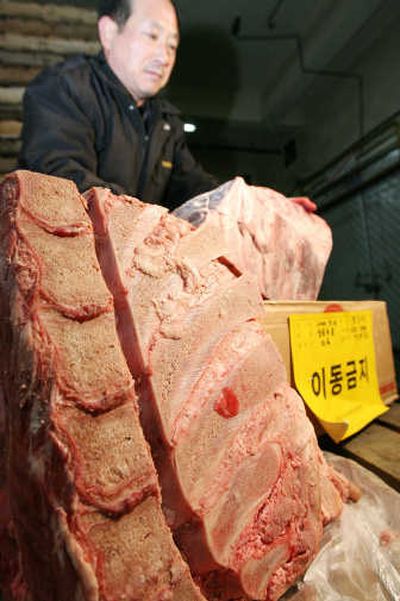Korea blocks U.S. beef

SEOUL, South Korea – South Korea suspended U.S. beef imports on Friday after inspectors reportedly found a recent shipment contained bone that is banned because of concerns over mad cow disease.
The Agriculture Ministry said two vertebrae segments were found in one box of meat in an 18.5-ton shipment from the U.S. that arrived last week. Vertebrae are among parts – also including skulls and eyes – believed at risk of carrying the brain-wasting disease.
“The ministry suspended inspections of all U.S.-produced beef and asked the U.S. government to immediately halt sending any shipments,” it said in a statement.
Last year, South Korea agreed to import only boneless U.S. meat from cattle less than 30 months old, partially lifting an almost three-year ban imposed on American beef after the disease was discovered in the U.S.
Resumed imports from the U.S. prompted protests and scuffles with police and some shops to pull the meat from shelves.
South Korean regulators this year have banned individual U.S. companies after finding bones in shipments.
South Korea shut its doors to all American beef in December 2003, after mad cow disease was found in cattle in the U.S.
The suspension will remain in effect until after a new set of quarantine conditions are worked out in negotiations between the two countries that have yet to be scheduled, the ministry said.
Attempts to reach a U.S. Embassy spokesman were not immediately successful.
Scientists believe mad cow disease spreads when farmers feed cattle recycled meat and bones from infected animals. The disease is also believed to be linked to the rare but fatal human variant, Creutzfeldt-Jakob disease.
South Korea was the third-largest foreign market for American beef before it banned U.S. imports.
Meanwhile, South Korea’s Yonhap news agency reported that the Agriculture Ministry held a meeting of experts to seek their advice ahead of the upcoming talks with the U.S. on whether to further open the country’s beef market.
The ministry explained to the experts that the government is considering allowing imports of rib bones while maintaining a ban on imports of “special risk material” and intestinal parts, Yonhap said, citing unidentified experts who attended the meeting.
Rib meat is used to make galbi, a popular dish of marinated meat barbecued at diners’ tables that is a mainstay of the Korean diet.